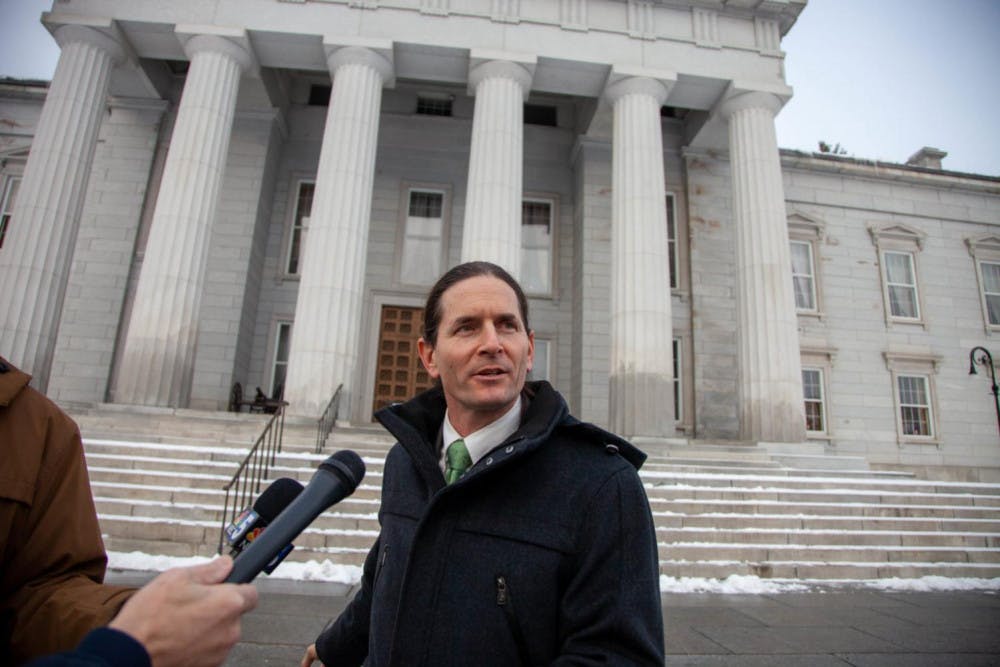Lt. Governor David Zuckerman announced Monday that he will run for governor of Vermont in 2020 in an effort to oust incumbent Governor Phil Scott. Zuckerman, a Progressive who has served as lieutenant governor since 2017, will join former Vermont Education Secretary Rebecca Holcombe on the Democratic ticket. Zuckerman cited the climate crisis as his primary motive for entering the race, claiming that Scott’s moderate republican approach has been insufficient.
“I think the urgency of our climate crisis has not really been felt in the political process,” Zuckerman said in an interview with Vermont Public Radio last week. “When we talk about the climate crisis, we can also talk about economic opportunity and investing in our future.”
Although Governor Phil Scott, who has served in the position since 2017, has not formally announced his candidacy for the 2020 race, his team has started fundraising operations and his entry is likely. A markedly popular governor who, according to Morning Consult, currently enjoys a 65% approval rating for his center-right ideology, Scott would be seeking his third two-year term. He most recently defeated Democrat Christine Hallquist, the first openly transgender candidate for governor in America, by a comfortable margin of 14.9 points in 2018.
The first challenger to Phil Scott for the 2020 election was Rebecca Holcombe, former Vermont Education Secretary, who announced her candidacy in July. Originally appointed to the position in 2013 and reaffirmed under Gov. Scott upon his election, Holcombe resigned in March 2018 in protest of Scott’s education agenda, which included a voucher program she believed would deepen inequality across the state. Now, she is running against him.
“I want to put it to work for every Vermonter in every corner of the state – not just the areas that are already doing well,” Holcombe told Seven Days after her announcement. “I’m gonna win by showing everyday working Vermonters that it’s not enough to talk.”
Zuckerman and Holcombe will face each other in Vermont’s gubernatorial Democratic primary later this year. If Gov. Scott officially enters the race, it is all but assured that the popular incumbent will represent the Republican party, though lawyer and farmer John Klar has also announced a bid for the nomination. Like Zuckerman and Holcombe, the political neophyte is running on the assertion that Gov. Scott’s moderate approach has been lackluster, though Klar believes the missing factor is traditional Republican values. “Vermont’s state government has grown unwieldy and wasteful,” Klar’s website reads. “In order for Vermonters to thrive economically, these swollen tax and regulatory burdens must be lifted.”
As these candidates vie for the top seat in Montpelier, a queue has already formed to fill Zuckerman’s lieutenant governorship position. Most notable among them thus far is the Vermont State Senate’s President Pro Tem Tim Ashe, a Democrat who was first elected in 2008 and has led the governing body for three years. After spending 2019 advocating for a $15 minimum wage and abortion rights legislation, Ashe seeks to use the new position to focus on “revitalizing small communities, trying to lift more people out of poverty.”
Also running for the lieutenant governorship are progressive activist Brenda Siegel, who was defeated in the gubernatorial Democratic primary in 2018, and Republicans Meg Hansen, Dana Colson and Dwayne Tucker. The race may continue to grow as many other potential candidates announce their campaigns publicly.
Although technically the second in command, the title of lieutenant governor is mostly ceremonial and not as policy-oriented as the governorship. Vermont is just one of two states, alongside New Hampshire, that holds gubernatorial elections every two years instead of four — and does not have term limits for top positions, allowing Gov. Scott to run indefinitely yet leaving significant room for challengers.
From the left, Gov. Scott has garnered some support for banning bump stocks, passing pro-choice legislation and frequently criticizing President Trump. However, the same groups have condemned the Governor for other times wavering on these issues and taking a leisurely approach to the climate crisis. He has avoided passing sweeping legislation and was quoted in fall 2019 saying that going forward he is “not looking to come out with something dramatic,” despite a recent poll from the Vermont Public Research Interest Group that shows 76% of Vermonters are worried about global warming. Both Zuckerman and Holcombe plan to capitalize on this discrepancy.
Zuckerman has proposed a marginal tax surcharge for Vermont’s wealthiest residents, the money from which he plans to allocate toward weatherization, solar panels and grants for working-class residents to access environmentally-friendly resources such as lectric cars.
Likely to back such measures is Independent Vermont Senator and 2020 Democratic presidential candidate Bernie Sanders, who has endorsed Lt. Gov. Zuckerman in past elections. Although Sen. Sanders has yet to comment on the race at hand, Zuckerman has already endorsed the senator’s bid for president. The pair’s relationship dates back more than 30 years, and they have often aligned on initiatives and worked alongside one another in office. Sen. Sanders also helped Zuckerman campaign in the past. In a fundraising email blast from 2018, the Senator shared a 1992 photo of himself and Zuckerman and wrote, “We need leaders like him who fight for what is best for all of us, not just the wealthy and corporations.”
It is speculated that Sen. Sanders’s corresponding presidential campaign will bolster Lt. Gov. Zuckerman’s chance at defeating Gov. Scott with the hope that the politicians can align on the ballot in November.
“Win or lose,” Zuckerman told the VTDigger, “It’s important that we get out there, we talk about these issues, and we put them on the front-burner.”
Zuckerman challenges Scott in race for governorship

VT DIGGER
Lieutenant Governor David Zuckerman, in a challenge to incumbent Governor Phil Scott, cited the climate crisis as a primary motive for running.
Lieutenant Governor David Zuckerman, in a challenge to incumbent Governor Phil Scott, cited the climate crisis as a primary motive for running.
Comments



